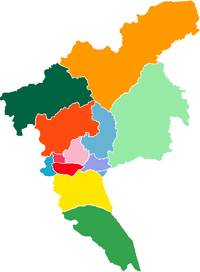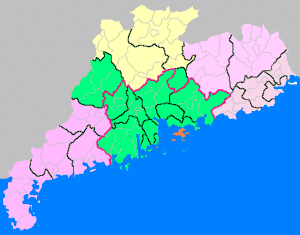Huadu District
| Huadu 花都区 | |
|---|---|
| District | |
.jpg) Hongshan in Huadu District | |
 Huadu District in Guangzhou
| |
| Coordinates: 23°24′N 113°13′E / 23.400°N 113.217°ECoordinates: 23°24′N 113°13′E / 23.400°N 113.217°E | |
| Country | People's Republic of China |
| Province | Guangdong |
| Sub-provincial city | Guangzhou |
| Area | |
| • Total | 961 km2 (371 sq mi) |
| Population (2006) | |
| • Total | 636,706 |
| • Density | 660/km2 (1,700/sq mi) |
| Time zone | UTC+8 (China Standard) |
| Postal code | 510800 |
| Area code(s) | 020 |
| Website | archived link |
| Huadu District | |||||||||||||||
| Simplified Chinese | 花都区 | ||||||||||||||
|---|---|---|---|---|---|---|---|---|---|---|---|---|---|---|---|
| Traditional Chinese | 花都區 | ||||||||||||||
| Cantonese Yale | Fādōu Kēui | ||||||||||||||
| Hanyu Pinyin | Huādu Qū | ||||||||||||||
| |||||||||||||||
| Alternative Chinese name | |||||||||||||||
| Chinese | 花都 | ||||||||||||||
| Cantonese Yale | Fādōu | ||||||||||||||
| Hanyu Pinyin | Huādu | ||||||||||||||
| Literal meaning | flower capital | ||||||||||||||
| |||||||||||||||
| Second alternative Chinese name | |||||||||||||||
| Simplified Chinese | 花县 | ||||||||||||||
| Traditional Chinese | 花縣 | ||||||||||||||
| Cantonese Yale | Fāyún | ||||||||||||||
| Hanyu Pinyin | Huāxiàn | ||||||||||||||
| |||||||||||||||
Huadu District is a district of Guangzhou, the capital of Guangdong province, China. It is located in the far northern suburbs of the city.
Xinhua Town is the seat of local government, and of the district CCP committee.[1] The distric is mostly Hakka speaking,[2] and is the ancestral home of many Overseas Chinese of Hakka descent.
Hua County was the hometown of many Taiping Rebellion leaders like Hong Xiuquan and Hong Rengan.
History
The district was established in the Qing Dynasty (1644–1911) as a county, Hua County or Huaxian (Chinese: 花县; pinyin: Huāxiàn; Cantonese Yale: Fāyún, also known as Fahsien), which was located north of the then city limits of Guangzhou. It remained a county until 1993, when it was recognized as a city and renamed as Huadu (Chinese: 花都; pinyin: Huādu; Cantonese Yale: Fādōu). In 2000, it became an attached northern suburban district of the expanded municipality of Guangzhou.
Natives of Huadu speak a dialect of Yue Chinese called Huaxian (Chinese: 花县话; Cantonese Yale: Fāyún wá or Fahsien). In addition to its population, Huadu is the hometown of approximately 300,000 overseas Chinese, including some in Hong Kong and Macao.[1]
Guangzhou Baiyun International Airport, Guangzhou's main airport, is located in the district, as is Guangzhou North Railway Station on the Wuhan–Guangzhou High-Speed Railway.
Resources
Huadu District is rich in natural resources. With a rich rainfall, Huadu is abundant in a variety of crops, vegetables, tea, litchis, bananas, longans, peanuts and sugarcane.
Jingtang Lotus Roots are thought to originate here in Jingtang Town.
The mines proved up are up to 18 varieties among which the largely-reserved and high-rank limestone, kaolin, clay and granite etc have a bright future of mining. The district also is rich in water. The annual flux of the surface water on average for years is 1.15 billion cube meters. There are 17 reservoirs of medium and small size in the district. The Liuxi River and Bajiang River are across the district.[3]
Administrative divisions
There are currently 4 subdistricts and 6 towns.
On 2 December 2013 three new subdistricts (Huacheng, Xiuquan, & Xinya) were established from carving out Xinhua Subdistrict, while upgrading Yayao Town into a subdistrict.[4]
| Name | Chinese (S) | Hanyu Pinyin | Canton Romanization | Population (2010)[5] | Area (km2) |
|---|---|---|---|---|---|
| Xinhua Subdistrict | 新华街道 | Xīnhuá Jiēdào | sen1 wa4 gai1 dou6 | 381,311 | 29.81 |
| Huacheng Subdistrict | 花城街道 | Huāchéng Jiēdào | fa1 xing4 gai1 dou6 | 26.56 | |
| Xinya Subdistrict | 新雅街道 | Xīnyǎ Jiēdào | sen1 nga5 gai1 dou6 | 20,520 | 32.98 |
| Xiuquan Subdistrict | 秀全街道 | Xiùquán Jiēdào | seo3 qun4 gai1 dou6 | 54.19 | |
| Timian town | 梯面镇 | Tīmiàn Zhèn | tei1 min6 zen3 | 9,516 | 91.20 |
| Huashan town | 花山镇 | Huāshān Zhèn | fa1 san1 zen3 | 99,262 | 116.40 |
| Tanbu town | 炭步镇 | Tànbù Zhèn | tan3 bou6 zen3 | 55,797 | 113.33 |
| Chini town | 赤坭镇 | Chìní Zhèn | cég3 nei4 zen3 | 56,609 | 160.03 |
| Shiling town | 狮岭镇 | Shīlǐng Zhèn | xi1 léng5 zen3 | 203,254 | 136.31 |
| Huadong town | 花东镇 | Huādōng Zhèn | fa1 dung1 zen3 | 118,736 | 208.44 |
Transportation
Metro
Huadu is currently service by two metro line operated by Guangzhou Metro:
Sister cities

References
- 1 2 "A Survey of Huadu District". lifeofguangzhou.com. 2006.
Huadu district has a 720,000 population. It is the hometown of many overseas Chinese, and it has approximate 300,000 overseas Chinese and Hong Kong and Macao compatriots.
- ↑ http://m.huadu.gd.cn/article/show-36716.html
- ↑ Hwang, Jessie. "A Survey of Huadu District". Retrieved 25 January 2018.
- ↑ "关于同意广州市调整花都区部分行政区划的批复". Guangdong Province Census Network. Guangdong Provincial Government. Retrieved 11 April 2018.
- ↑ shi, Guo wu yuan ren kou pu cha ban gong; council, Guo jia tong ji ju ren kou he jiu ye tong ji si bian = Tabulation on the 2010 population census of the people's republic of China by township / compiled by Population census office under the state; population, Department of; statistics, employment statistics national bureau of (2012). Zhongguo 2010 nian ren kou pu cha fen xiang, zhen, jie dao zi liao (Di 1 ban. ed.). Beijing Shi: Zhongguo tong ji chu ban she. ISBN 978-7-5037-6660-2.
External links
| Wikimedia Commons has media related to Huadu District. |


